Connect With Us
Blog
Understanding Complex Trauma of the Foot and Ankle

Complex trauma of the foot and ankle is a severe condition that occurs when fractures are accompanied by significant soft tissue damage. This type of injury often involves the neurovascular structures, such as nerves and blood vessels, as well as the joints in the affected area. The severity of the damage can cause considerable pain, swelling, and dysfunction, making it challenging for individuals to move or bear weight on the injured foot or ankle. Complex trauma typically occurs due to high-impact incidents like car accidents, falls from heights, or severe sports injuries. The combination of broken bones, torn ligaments, and compromised blood vessels or nerves requires immediate medical attention. Surgery is sometimes needed to repair fractures, reconstruct soft tissues, and restore normal function. Timely treatment prevents infection, chronic pain, or long-term disability. If you have endured this type of foot and ankle trauma, it is suggested that you are under the care of a podiatrist who can help you with effective relief and treatment solutions.
Foot and ankle trauma is common among athletes and the elderly. If you have concerns that you may have experienced trauma to the foot and ankle, consult with Dr. Yeon A. Shim from Roselle Podiatry Group. Our doctor will assess your condition and provide you with quality foot and ankle treatment.
Foot and ankle trauma cover a range of injuries all over the foot; common injuries include:
- Broken bones
- Muscle strains
- Injuries to the tendons and ligaments
- Stress fractures
Symptoms
Symptoms of foot and ankle injuries vary depending on the injury, but more common ones include:
- Bruising
- Inflammation/ Swelling
- Pain
Diagnosis
To properly diagnose the exact type of injury, podiatrists will conduct a number of different tests. Some of these include sensation and visual tests, X-rays, and MRIs. Medical and family histories will also be taken into account.
Treatment
Once the injury has been diagnosed, the podiatrist can than offer the best treatment options for you. In less severe cases, rest and keeping pressure off the foot may be all that’s necessary. Orthotics, such as a specially made shoes, or immobilization devices, like splints or casts, may be deemed necessary. Finally, if the injury is severe enough, surgery may be necessary.
If you have any questions, please feel free to contact our office located in Roselle, NJ . We offer the newest diagnostic and treatment technologies for all your foot care needs.
Do Your Child's Feet Hurt?
Understanding Big Toe Arthritis
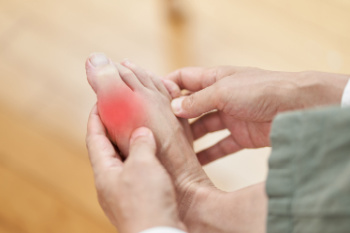
Hallux rigidus is a form of arthritis affecting the big toe joint, causing stiffness, pain, and limited motion. Over time, everyday activities like walking or wearing shoes can become difficult. It develops when the joint cartilage wears down, often due to overuse, injury, or abnormal foot structure, leading to inflammation and bone spurs. Risk factors include repetitive stress on the toe, family history, or conditions like gout. A podiatrist diagnoses hallux rigidus through a physical exam and imaging tests like X-rays to assess joint damage. Early stages can be managed with shoe modifications, custom orthotics, and anti-inflammatory medications. Severe cases might require corticosteroid injections or surgery, such as joint fusion or reconstruction. Preventing further damage involves wearing proper footwear and avoiding high-impact activities. If you have big toe pain, it is suggested that you see a podiatrist for a proper diagnosis and treatment.
Toe pain can disrupt your daily activities. If you have any concerns, contact Dr. Yeon A. Shim of Roselle Podiatry Group. Our doctor can provide the care you need to keep you pain-free and on your feet.
What Causes Toe Pain?
Most severe toe pain is caused due to a sports injury, trauma from dropping something heavy on the toe, or bumping into something rigid. Other problems can develop over time for various reasons.
Toe pain can be caused by one or more ailments. The most common include:
- Trauma
- Sports injury
- Wearing shoes that are too tight
- Arthritis
- Gout
- Corns and calluses
- Hammertoe
- Bunions
- Blisters
- Ingrown toenails
- Sprains
- Fractures (broken bones)
- Dislocations
When to See a Podiatrist
- Severe pain
- Persistent pain that lasts more than a week
- Signs of infection
- Continued swelling
- Pain that prevents walking
Diagnosis
In many cases the cause of toe pain is obvious, but in others, a podiatrist may want to use more advanced methods to determine the problem. These can range from simple visual inspections and sensation tests to X-rays and MRI scans. Prior medical history, family medical history, and any recent physical traumatic events will all be taken into consideration for a proper diagnosis.
Treatment
Treatments for toe pain and injuries vary and may include shoe inserts, padding, taping, medicines, injections, and in some cases, surgery. If you believe that you have broken a toe, please see a podiatrist as soon as possible.
If you have any questions please feel free to contact our office located in Roselle, NJ . We offer the newest diagnostic tools and technology to treat your foot and ankle needs.
Ankle Fracture Surgery Facts
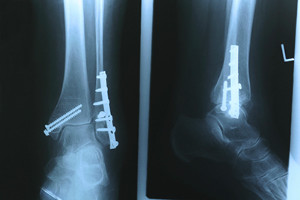
Ankle fracture surgery is performed to treat severe fractures that cannot be healed through non-surgical methods. This type of surgery is often required when bones are displaced, or the fracture is unstable, making it difficult for the ankle to heal properly. During the procedure, the surgeon realigns the broken bones and uses screws, plates, or rods to hold them in place while they heal. Ankle fracture surgery is typically followed by a period of immobilization, often involving a cast or brace to protect the ankle. Rehabilitation, which often includes specific stretches and exercises, is essential to restore strength, flexibility, and range of motion. While complications are rare, they can include infection, nerve damage, or problems with bone healing. If you have fractured your ankle, it is suggested that you consult a podiatrist who can determine what the best treatment is for you, which may include surgery.
Foot surgery is sometimes necessary to treat a foot ailment. To learn more, contact Dr. Yeon A. Shim of Roselle Podiatry Group. Our doctor will assist you with all of your foot and ankle needs.
When Is Surgery Necessary?
Foot and ankle surgery is generally reserved for cases in which less invasive, conservative procedures have failed to alleviate the problem. Some of the cases in which surgery may be necessary include:
- Removing foot deformities like bunions and bone spurs
- Severe arthritis that has caused bone issues
- Cosmetic reconstruction
What Types of Surgery Are There?
The type of surgery you receive will depend on the nature of the problem you have. Some of the possible surgeries include:
- Bunionectomy for painful bunions
- Surgical fusion for realignment of bones
- Neuropathy decompression surgery to treat nerve damage
Benefits of Surgery
Although surgery is usually a last resort, it can provide more complete pain relief compared to non-surgical methods and may allow you to finally resume full activity.
Surgical techniques have also become increasingly sophisticated. Techniques like endoscopic surgery allow for smaller incisions and faster recovery times.
If you have any questions please feel free to contact our office located in Roselle, NJ . We offer the newest diagnostic and treatment technologies for all your foot and ankle needs.
Diabetic Foot Care
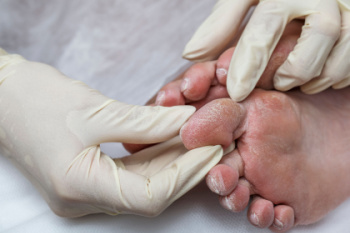
Caring for diabetic feet is essential to avoid complications like infections or ulcers. Begin by inspecting your feet daily for cuts, blisters, or changes in color, especially if you have reduced sensation due to neuropathy. Wash your feet with warm water and mild soap, ensuring thorough drying, particularly between toes. Moisturize to prevent cracking, but avoid applying lotion between the toes to minimize infection risk. Wear well-fitting, protective shoes and socks designed for diabetic patients to reduce pressure and prevent injuries. Trim toenails straight across to avoid ingrown nails. Control blood sugar levels to enhance circulation and promote healing. Avoid walking barefoot, even at home, to prevent unnoticed injuries. If you have diabetes and foot issues arise or are in need of preventive guidance, it is suggested that you schedule regular check-ups with a podiatrist. This foot specialist can assess your foot health, offer personalized advice, and help you maintain optimal care.
Diabetic foot care is important in preventing foot ailments such as ulcers. If you are suffering from diabetes or have any other concerns about your feet, contact Dr. Yeon A. Shim from Roselle Podiatry Group. Our doctor can provide the care you need to keep you pain-free and on your feet.
Diabetic Foot Care
Diabetes affects millions of people every year. The condition can damage blood vessels in many parts of the body, especially the feet. Because of this, taking care of your feet is essential if you have diabetes, and having a podiatrist help monitor your foot health is highly recommended.
The Importance of Caring for Your Feet
- Routinely inspect your feet for bruises or sores.
- Wear socks that fit your feet comfortably.
- Wear comfortable shoes that provide adequate support.
Patients with diabetes should have their doctor monitor their blood levels, as blood sugar levels play such a huge role in diabetic care. Monitoring these levels on a regular basis is highly advised.
It is always best to inform your healthcare professional of any concerns you may have regarding your feet, especially for diabetic patients. Early treatment and routine foot examinations are keys to maintaining proper health, especially because severe complications can arise if proper treatment is not applied.
If you have any questions please feel free to contact our office located in Roselle, NJ . We offer the newest diagnostic and treatment technologies for all your foot and ankle needs.
Wounds That Don't Heal Need to Be Checked
Foot and Ankle Pain Can Be Warnings

Foot and ankle pain can range from mild discomfort to a serious issue that disrupts daily life. Persistent or worsening foot pain should not be ignored, as it may indicate conditions like arthritis, tendon injuries, or even nerve damage. For example, arthritis in the foot or ankle often causes stiffness and swelling, which limits mobility and affects daily activities. Tendon injuries or conditions like acquired flatfoot can result in pain on the inside of the foot or ankle, often becoming worse with activity. Another common concern is heel pain, stemming from a heel spur, which is a calcium deposit that can irritate nearby tissues. Pain in the big toe can severely affect the way you walk, leading to harmful gait and posture changes. A podiatrist is skilled in diagnosing and managing foot, toe, and ankle-related conditions. Treatment solutions may include custom orthotics, injections, or, when necessary, surgery. If you have foot, toe, or ankle pain, it is suggested that you schedule an appointment with a podiatrist for an exam and diagnosis.
Foot Pain
Foot pain can be extremely painful and debilitating. If you have a foot pain, consult with Dr. Yeon A. Shim from Roselle Podiatry Group. Our doctor will assess your condition and provide you with quality foot and ankle treatment.
Causes
Foot pain is a very broad condition that could be caused by one or more ailments. The most common include:
- Bunions
- Hammertoes
- Plantar Fasciitis
- Bone Spurs
- Corns
- Tarsal Tunnel Syndrome
- Ingrown Toenails
- Arthritis (such as Gout, Rheumatoid, and Osteoarthritis)
- Flat Feet
- Injury (from stress fractures, broken toe, foot, ankle, Achilles tendon ruptures, and sprains)
- And more
Diagnosis
To figure out the cause of foot pain, podiatrists utilize several different methods. This can range from simple visual inspections and sensation tests to X-rays and MRI scans. Prior medical history, family medical history, and any recent physical traumatic events will all be taken into consideration for a proper diagnosis.
Treatment
Treatment depends upon the cause of the foot pain. Whether it is resting, staying off the foot, or having surgery; podiatrists have a number of treatment options available for foot pain.
If you have any questions, please feel free to contact our office located in Roselle, NJ . We offer the newest diagnostic and treatment technologies for all your foot care needs.
Facts About Foot Stress Fractures

Stress fractures are hairline cracks in bones caused by repetitive stress rather than a sudden injury. Stress fractures, which are common among runners and athletes like basketball players, frequently affect the metatarsals, heel bone, and other weight-bearing bones in the foot and ankle. Symptoms of stress fractures usually start as mild pain during activity and gradually worsen, potentially leading to discomfort, even at rest. Contributing factors include sudden increases in activity levels, wearing improper footwear, or poor bone health. A podiatrist can diagnose stress fractures through imaging tests like MRI scans, as they are difficult to detect with X-rays. Treatment often involves using a walking boot or cast to immobilize the area and allow the bone to heal. In some cases, crutches may be necessary to reduce weight-bearing. A podiatrist can provide guidance on preventing future fractures by addressing footwear, activity modification, and proper nutrition for bone health. If you have foot pain caused by stress fractures, it is suggested that you schedule an appointment with a podiatrist for an exam and treatment.
Stress fractures occur when there is a tiny crack within a bone. To learn more, contact Dr. Yeon A. Shim from Roselle Podiatry Group. Our doctor can provide the care you need to keep you pain free and on your feet.
How Are They Caused?
Stress fractures are the result of repetitive force being placed on the bone. Since the lower leg and feet often carry most of the body’s weight, stress fractures are likely to occur in these areas. If you rush into a new exercise, you are more likely to develop a stress fracture since you are starting too much, too soon. Pain resulting from stress fractures may go unnoticed at first, however it may start to worsen over time.
Risk Factors
- Gender – They are more commonly found in women compared to men.
- Foot Problems – People with unusual arches in their feet are more likely to develop stress fractures.
- Certain Sports – Dancers, gymnasts, tennis players, runners, and basketball players are more likely to develop stress fractures.
- Lack of Nutrients – A lack of vitamin D and calcium may weaken the bones and make you more prone to stress fractures
- Weak Bones – Osteoporosis can weaken the bones therefore resulting in stress fractures
Stress fractures do not always heal properly, so it is important that you seek help from a podiatrist if you suspect you may have one. Ignoring your stress fracture may cause it to worsen, and you may develop chronic pain as well as additional fractures.
If you have any questions, please feel free to contact our office located in Roselle, NJ . We offer the newest diagnostic and treatment technologies for all your foot care needs.
Causes of Foot Pain While Skiing

Foot pain while skiing can be caused by several factors, including improper ski boot fit, lack of foot support, and extended periods of pressure on the feet. Wearing ill-fitting boots that are too tight or too loose can lead to blisters, bruising, or pinching, while poorly aligned boots can strain the feet and ankles. Additionally, skiing for long durations without proper foot care can result in soreness and fatigue. To prevent foot pain, it is vital to ensure that ski boots fit properly and provide adequate support. Custom insoles can help improve comfort and alignment. Taking regular breaks to stretch and relax the feet also helps reduce fatigue. Foot care includes wearing moisture-wicking socks, keeping feet warm and dry, and using foot exercises to maintain flexibility. If you enjoy skiing and have developed foot pain, it is suggested that you consult a podiatrist who can offer effective treatment solutions, and guide you on tips on wearing the right ski boots.
Sports related foot and ankle injuries require proper treatment before players can go back to their regular routines. For more information, contact Dr. Yeon A. Shim of Roselle Podiatry Group. Our doctor can provide the care you need to keep you pain-free and on your feet.
Sports Related Foot and Ankle Injuries
Foot and ankle injuries are a common occurrence when it comes to athletes of any sport. While many athletes dismiss the initial aches and pains, the truth is that ignoring potential foot and ankle injuries can lead to serious problems. As athletes continue to place pressure and strain the area further, a mild injury can turn into something as serious as a rupture and may lead to a permanent disability. There are many factors that contribute to sports related foot and ankle injuries, which include failure to warm up properly, not providing support or wearing bad footwear. Common injuries and conditions athletes face, including:
- Plantar Fasciitis
- Plantar Fasciosis
- Achilles Tendinitis
- Achilles Tendon Rupture
- Ankle Sprains
Sports related injuries are commonly treated using the RICE method. This includes rest, applying ice to the injured area, compression and elevating the ankle. More serious sprains and injuries may require surgery, which could include arthroscopic and reconstructive surgery. Rehabilitation and therapy may also be required in order to get any recovering athlete to become fully functional again. Any unusual aches and pains an athlete sustains must be evaluated by a licensed, reputable medical professional.
If you have any questions please feel free to contact our office located in Roselle, NJ . We offer the newest diagnostic and treatment technologies for all your foot and ankle needs.
It's Time for Beautiful Feet
More...
Achilles Tendonitis and Effective Stretches for Relief

Achilles tendonitis is an inflammation of the Achilles tendon, the large tendon connecting the calf muscles to the heel. This condition often causes pain, swelling, and stiffness, particularly during activities such as running or climbing stairs. Achilles tendonitis typically results from overuse, repetitive stress, or wearing improper footwear, and it can become chronic if not addressed properly. Effective stretches can help alleviate pain and promote healing. A gentle calf stretch can be performed by standing facing a wall, placing one foot behind the other, and leaning forward to feel a stretch in the calf and Achilles. Another beneficial stretch is the towel stretch, where a towel is looped around the foot while sitting and gently pulling it toward the body to stretch the tendon. If you are suffering from an Achilles tendon injury, it is strongly suggested that you consult a podiatrist who can effectively treat this condition.
Achilles tendon injuries need immediate attention to avoid future complications. If you have any concerns, contact Dr. Yeon A. Shim of Roselle Podiatry Group. Our doctor can provide the care you need to keep you pain-free and on your feet.
What Is the Achilles Tendon?
The Achilles tendon is a tendon that connects the lower leg muscles and calf to the heel of the foot. It is the strongest tendon in the human body and is essential for making movement possible. Because this tendon is such an integral part of the body, any injuries to it can create immense difficulties and should immediately be presented to a doctor.
What Are the Symptoms of an Achilles Tendon Injury?
There are various types of injuries that can affect the Achilles tendon. The two most common injuries are Achilles tendinitis and ruptures of the tendon.
Achilles Tendinitis Symptoms
- Inflammation
- Dull to severe pain
- Increased blood flow to the tendon
- Thickening of the tendon
Rupture Symptoms
- Extreme pain and swelling in the foot
- Total immobility
Treatment and Prevention
Achilles tendon injuries are diagnosed by a thorough physical evaluation, which can include an MRI. Treatment involves rest, physical therapy, and in some cases, surgery. However, various preventative measures can be taken to avoid these injuries, such as:
- Thorough stretching of the tendon before and after exercise
- Strengthening exercises like calf raises, squats, leg curls, leg extensions, leg raises, lunges, and leg presses
If you have any questions please feel free to contact our office located in Roselle, NJ . We offer the newest diagnostic tools and technology to treat your foot and ankle needs.
Ankle Sprains and Anatomy
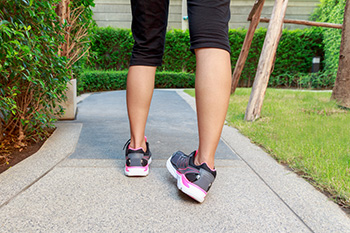
An ankle sprain occurs when the ligaments surrounding the ankle joint are overstretched or torn, resulting in pain and swelling. The ankle is made up of three bones which are the tibia, fibula, and talus, and held together by ligaments that provide stability. The most common ligaments involved in an ankle sprain are the anterior talofibular ligament and the calcaneofibular ligament. These ligaments help stabilize the ankle during movement. An ankle sprain typically happens when the foot twists or rolls in an unnatural direction, often during activities like running, jumping, or sports. Causes can include walking or running on uneven surfaces, sudden changes in direction, or wearing improper footwear. Symptoms include pain, swelling, bruising, and difficulty moving the foot or bearing weight. If you have sprained your ankle, it is suggested that you promptly schedule an appointment with a podiatrist who can provide an accurate diagnosis and effective treatment.
Although ankle sprains are common, they aren’t always minor injuries. If you need your ankle injury looked at, contact Dr. Yeon A. Shim from Roselle Podiatry Group. Our doctor can provide the care you need to keep you pain-free and on your feet.
How Does an Ankle Sprain Occur?
Ankle sprains are the result of a tear in the ligaments within the ankle. These injuries may happen when you make a rapid shifting movement while your foot is planted. A less common way to sprain your ankle is when your ankle rolls inward while your foot turns outward.
What Are the Symptoms?
- Pain at the sight of the tear
- Bruising/Swelling
- Ankle area is tender to touch
- In severe cases, may hear/feel something tear
- Skin discoloration
Preventing a Sprain
- Wearing appropriate shoes for the occasion
- Stretching before exercises and sports
- Knowing your limits
Treatment of a Sprain
In many cases, the RICE method (Rest, Ice, Compression, and Elevate) is used to treat ankle sprains. However, you should see a podiatrist to see which treatment option would work best with your injury. In severe cases, surgery may be required.
It is important to ask your doctor about rehab options after you receive treatment for your injury. Stretching, strength training, and balance exercises may help the ankle heal while also preventing further injury.
If you have any questions, please feel free to contact our office located in Roselle, NJ . We offer the newest diagnostic and treatment technologies for all your foot care needs.
Saving Limbs With Diabetic Foot Care
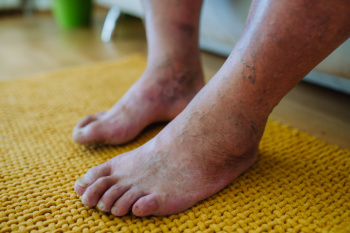
Poor diabetic foot care can lead to serious complications, including infections, ulcers, and even amputations. Individuals with diabetes often experience reduced blood flow and nerve damage, which can mask injuries and make it difficult to detect problems early. When wounds are left untreated, they can quickly become infected, leading to more severe health issues. Proper diabetic foot care is essential in preventing these complications and can significantly reduce the risk of limb loss. Regularly inspecting the feet for cuts, blisters, or changes in color, along with maintaining good hygiene and wearing appropriate footwear, can help identify potential problems early. If you have diabetes, it is strongly suggested that you are under the care of a podiatrist who can help you to manage this serious condition.
Diabetic foot care is important in preventing foot ailments such as ulcers. If you are suffering from diabetes or have any other concerns about your feet, contact Dr. Yeon A. Shim from Roselle Podiatry Group. Our doctor can provide the care you need to keep you pain-free and on your feet.
Diabetic Foot Care
Diabetes affects millions of people every year. The condition can damage blood vessels in many parts of the body, especially the feet. Because of this, taking care of your feet is essential if you have diabetes, and having a podiatrist help monitor your foot health is highly recommended.
The Importance of Caring for Your Feet
- Routinely inspect your feet for bruises or sores.
- Wear socks that fit your feet comfortably.
- Wear comfortable shoes that provide adequate support.
Patients with diabetes should have their doctor monitor their blood levels, as blood sugar levels play such a huge role in diabetic care. Monitoring these levels on a regular basis is highly advised.
It is always best to inform your healthcare professional of any concerns you may have regarding your feet, especially for diabetic patients. Early treatment and routine foot examinations are keys to maintaining proper health, especially because severe complications can arise if proper treatment is not applied.
If you have any questions please feel free to contact our office located in Roselle, NJ . We offer the newest diagnostic and treatment technologies for all your foot and ankle needs.





